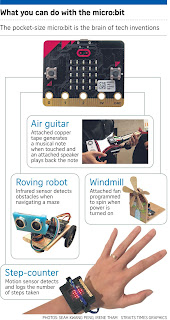Under govt initiative to spark interest in technology, the micro:bit will be rolled out to schools and the community
By Irene Tham, Senior Tech Correspondent,The Straits Times, 14 Apr 2017
To the children in the classroom, it is a toy.
To the Government, it is a device that could help nurture Singapore's future army of coders.
A pocket-size, codeable computer called the micro:bit is being targeted to reach some 100,000 school-going children and adults over the next two years.
The idea is to let the children tinker with it, while they learn to code and, perhaps, develop a love for technology.
Announcing the move yesterday, Minister for Communications and Information Yaacob Ibrahim said: "Who knows, one day we may be nurturing Singapore's own generation of Steve Jobs."
The $30 micro:bit contains a programmable array of LED lights, sensors, a Bluetooth chip and an accelerometer. Users can write codes to turn the micro:bit into a locator tool, for instance, by detecting the presence of another micro:bit tagged to their belongings.
By Irene Tham, Senior Tech Correspondent,The Straits Times, 14 Apr 2017
To the children in the classroom, it is a toy.
To the Government, it is a device that could help nurture Singapore's future army of coders.
A pocket-size, codeable computer called the micro:bit is being targeted to reach some 100,000 school-going children and adults over the next two years.
The idea is to let the children tinker with it, while they learn to code and, perhaps, develop a love for technology.
Announcing the move yesterday, Minister for Communications and Information Yaacob Ibrahim said: "Who knows, one day we may be nurturing Singapore's own generation of Steve Jobs."
The $30 micro:bit contains a programmable array of LED lights, sensors, a Bluetooth chip and an accelerometer. Users can write codes to turn the micro:bit into a locator tool, for instance, by detecting the presence of another micro:bit tagged to their belongings.
The device is already in use in schools in Britain to help teach coding and inspire interest in STEM (science, technology, engineering and mathematics) subjects.
At his ministry's annual workplan seminar yesterday, Dr Yaacob said Singaporeans need a curious mind and the passion to tinker and create things with their hands.
The Infocomm Media Development Authority (IMDA) will work with the Ministry of Education (MOE) to roll out micro:bit as part of its new Digital Maker Programme to interested primary and secondary schools over the next two years.
Microsoft Singapore will provide training for the MOE teachers and absorb the cost. The whole exercise is estimated to cost up to $3 million.
Microsoft Singapore will provide training for the MOE teachers and absorb the cost. The whole exercise is estimated to cost up to $3 million.
The devices will be distributed by Home-Fix DIY to schools, and by the end of this month, it will also be on sale at Home-Fix's retail stores islandwide.
The initiative complements existing enrichment programmes such as Code@SG's Code for Fun, introduced in June 2015 in MOE schools to give children a brush with computing through robotic kits such as Leo Wedo and MoWay, and microcontrollers such as Arduino.
It is part of a larger strategy by the Government to plug the technology manpower gap in Singapore.
Since then, 128 primary and secondary schools have rolled out the Code for Fun scheme, and 56,000 students - some as young as seven years old - have signed up.
The Digital Maker Programme will also be rolled out to the community via the People's Association, the Science Centre Singapore and self-help groups.
In IMDA's early trials at Tanjong Pagar and Toa Payoh East community centres, residents there had used the micro:bit to create an automated watering system for the community garden.
Dr Yaacob said seed funding will be provided to local companies that develop products like the micro:bit.
CHIJ Kellock Primary pupil Darina Daud, 12, said: "I thought computing was going to be boring - until I tried making a digital greeting card with micro:bit."
CHIJ Kellock Primary pupil Darina Daud, 12, said: "I thought computing was going to be boring - until I tried making a digital greeting card with micro:bit."

No comments:
Post a Comment